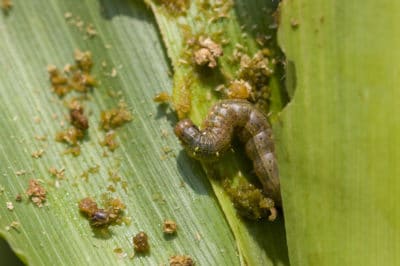What Kinds of Pests Target Corn?
Many different kinds of pests will happily eat your corn crop from the root to the tassel and ears. Depending on where you live, some of the most prevalent pests include:
- European Corn Borer
- Corn Root Aphids
- Corn Rootworm
- Corn Sap Beetles
Tip: Your local nursery will be able to tell you which specific pests thrive in your geographical area.
What Damage Can Pests Do?
If you end up with an infestation of pests, it is crucial for you to take immediate steps to treat your corn crop. Some pests attack the root of the corn while others feast on the leaves, and some pests will eat the kernels off the cobs.
If left untreated, pests will decimate your entire corn crop. Unfortunately, corn plants damaged by hungry pests are also more susceptible to diseases that can quickly kill every stalk you have.
How To Tell if You Have Corn Pests
The first place you will notice most pests is in your corn leaves. There may be discoloration in spots, or you will see holes where the pest has started to eat the leaves. If you see holes, look at the underside of your leaves; often corn pests will gather there.
Depending on the pest, you may also notice the tips of your ears turning black where the insect has started to eat, or you could see the entire corn stalk falling over. In these cases, the infestation has been unnoticed for quite some time and may be impossible to treat.
Prevention of Corn Pests
As with most things, preventing corn pests from decimating your entire crop is far easier than treating an existing infestation. Be sure to clear your field of corn rubbish as soon as you harvest the plants, and till the ground thoroughly in the fall and the spring. Integrated Pest Management is also an effective way of both treating and preventing crop loss.
As long as you keep in mind that preventing pests is more natural than getting rid of them, you should be well on your way to having a bumper harvest.
